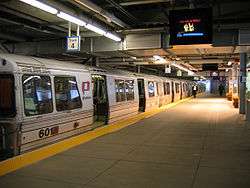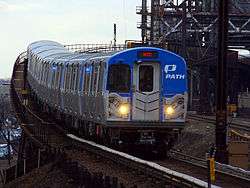Hoboken–World Trade Center
 Hoboken-bound train at the World Trade Center PATH station. (2005) | |||||||||||||||||||||||||||||||||||||||||||||||||||||||||||||||||||||||||||||||||||||||||||||||||||||||||||||||||||||||||||
| Overview | |||||||||||||||||||||||||||||||||||||||||||||||||||||||||||||||||||||||||||||||||||||||||||||||||||||||||||||||||||||||||||
| Type | Rapid transit | ||||||||||||||||||||||||||||||||||||||||||||||||||||||||||||||||||||||||||||||||||||||||||||||||||||||||||||||||||||||||||
| System | Port Authority Trans Hudson | ||||||||||||||||||||||||||||||||||||||||||||||||||||||||||||||||||||||||||||||||||||||||||||||||||||||||||||||||||||||||||
| Status | Operational | ||||||||||||||||||||||||||||||||||||||||||||||||||||||||||||||||||||||||||||||||||||||||||||||||||||||||||||||||||||||||||
| Locale | Hudson County, New Jersey and Manhattan, New York | ||||||||||||||||||||||||||||||||||||||||||||||||||||||||||||||||||||||||||||||||||||||||||||||||||||||||||||||||||||||||||
| Termini |
World Trade Center (south) Hoboken (north) | ||||||||||||||||||||||||||||||||||||||||||||||||||||||||||||||||||||||||||||||||||||||||||||||||||||||||||||||||||||||||||
| Stations | 4 | ||||||||||||||||||||||||||||||||||||||||||||||||||||||||||||||||||||||||||||||||||||||||||||||||||||||||||||||||||||||||||
| Operation | |||||||||||||||||||||||||||||||||||||||||||||||||||||||||||||||||||||||||||||||||||||||||||||||||||||||||||||||||||||||||||
| Owner | Port Authority of New York and New Jersey | ||||||||||||||||||||||||||||||||||||||||||||||||||||||||||||||||||||||||||||||||||||||||||||||||||||||||||||||||||||||||||
| Operator(s) | Port Authority Trans-Hudson | ||||||||||||||||||||||||||||||||||||||||||||||||||||||||||||||||||||||||||||||||||||||||||||||||||||||||||||||||||||||||||
| Character | Underground | ||||||||||||||||||||||||||||||||||||||||||||||||||||||||||||||||||||||||||||||||||||||||||||||||||||||||||||||||||||||||||
| Technical | |||||||||||||||||||||||||||||||||||||||||||||||||||||||||||||||||||||||||||||||||||||||||||||||||||||||||||||||||||||||||||
| Line length | 3 miles (4.8 km) | ||||||||||||||||||||||||||||||||||||||||||||||||||||||||||||||||||||||||||||||||||||||||||||||||||||||||||||||||||||||||||
| Track gauge | 1,435 mm (4 ft 8 1⁄2 in) | ||||||||||||||||||||||||||||||||||||||||||||||||||||||||||||||||||||||||||||||||||||||||||||||||||||||||||||||||||||||||||
| Electrification | Third rail | ||||||||||||||||||||||||||||||||||||||||||||||||||||||||||||||||||||||||||||||||||||||||||||||||||||||||||||||||||||||||||
| |||||||||||||||||||||||||||||||||||||||||||||||||||||||||||||||||||||||||||||||||||||||||||||||||||||||||||||||||||||||||||
The Hoboken–World Trade Center is a rapid transit service operated by the Port Authority Trans-Hudson (PATH). It is colored green on the PATH service map and trains on this service display green marker lights.[1] This service operates from the Hoboken Terminal in Hoboken, New Jersey, by way of the Downtown Hudson Tubes to the World Trade Center in Lower Manhattan, New York.[1] The 3-mile (4.8 km) trip takes 11 minutes to complete, and is the shortest route in the PATH system.[2]
This service operates from 6:00 to 23:00 (11:00 PM) on weekdays, and does not operate during the late-night hours or on weekends.[3] Passengers wishing to travel from Hoboken to World Trade Center at these times must take the Journal Square – 33rd Street (via Hoboken) train from Hoboken and transfer at Grove Street to the Newark–World Trade Center train.[3] Previoulsly, this branch operated on weekends as well, which made it the only PATH line that ran at all times except late nights. This is the only route from PATH on which every station is Handicapped Accessible.
History
The Hoboken-World Trade Center service originated as the Hoboken – Hudson Terminal service operated by the Hudson and Manhattan Railroad (H&M). It originally operated only between Exchange Place in Jersey City and the Hudson Terminal in Manhattan beginning on July 19, 1909, and was extended to Hoboken Terminal on August 2, 1909.
The H&M was succeeded by Port Authority Trans-Hudson (PATH) in 1962. The Port Authority of New York and New Jersey began constructing the World Trade Center between 1966 and 1974, but opened World Trade Center Station in 1971. Additionally, two other stations were rebuilt by PANYNJ. Exchange Place (PATH station) was rebuilt during the 1960s and 1970s and the former Erie (H&M station) was rebuilt as Pavonia Avenue (PATH station), then renamed Pavonia/Newport (PATH station) eventually losing the "Pavonia" from the name by 2010. Hoboken Terminal had been undergoing restoration projects by New Jersey Transit beginning in the late 20th century.
Following the destruction of the World Trade Center station in the September 11 attacks, which also required the closing of Exchange Place, the Hoboken-World Trade Center branch was suspended. Instead, a temporary branch using the same color code (green) operated between Hoboken and Journal Square. When Exchange Place reopened on June 29, 2003, the green color code was used for the temporary Hoboken-Exchange Place branch. The Hoboken-World Trade Center branch was restored when the temporary World Trade Center station opened on November 23. On April 9, 2006, weekend service on this branch was discontinued to accommodate long-term construction on the World Trade Center site.
Station listing
| PATH Services | |
References
- 1 2 "PATH Maps". The Port Authority of New York and New Jersey. Retrieved March 31, 2011.
- ↑ "PATH Facts & Info". The Port Authority of New York and New Jersey. Retrieved March 31, 2011.
- 1 2 "PATH Full Schedules". The Port Authority of New York and New Jersey. Retrieved March 31, 2011.
